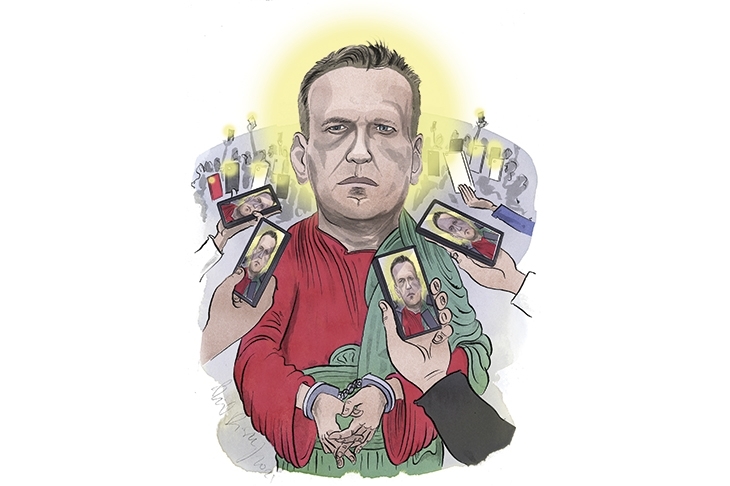Alexei Navalny, the man Putin tried to poison, has been sent to prison for two years and eight months — conveniently keeping him out of the way until long after September’s parliamentary elections. It’s fair to say this was no great surprise. The trial was typically stage-managed, Navalny locked in a glass box during the day-long proceedings that combined the surreal and the sinister.
The term represents the three and a half years suspended sentence Navalny was given in a 2014 trial — where the evidence was so flimsy as to be virtually translucent — less time already served. The European Court of Human Rights had ruled that trial ‘arbitrary and unfair’, but with such political cases, there need be no crime for punishment.
This is Putin’s power: the capacity to deploy the state with virtually no checks and balances. However, Navalny responded with his power: a barnstorming court speech that was not a plea for mitigation or a defence but instead a challenge and a manifesto.
Navalny responded with his power: a barnstorming court speech that was not a plea for mitigation but a manifesto
First, defiance. He denounced the case as a fabrication and an act of repressive theatre: ‘Locking me up isn’t difficult. What matters most is why this is happening. This is happening to intimidate large numbers of people. They’re imprisoning one person to frighten millions.’
However, he added that he hoped it would not work, as ‘this isn’t a demonstration of strength — it’s a show of weakness’. Ultimately, even the Kremlin ‘cannot lock up the whole country’.
Second, a platform. Beyond fighting against corruption and Putin’s arbitrary rule, many Russians are not sure quite for what Navalny stands. So he focused on bread and butter issues: standards of living, fairness, and democracy.
We’ve got 20 million people living below the poverty line. We have tens of millions of people living without the slightest prospects for the future. Life is bearable in Moscow, but travel 100 kilometres in any direction and everything’s a mess. Our whole country is living in this mess, without the slightest prospects, earning 20,000 rubles [£193] a month… We demand proper justice, decent treatment, participation in elections, and participation in the distribution of the national wealth.
Third, he made it personal. Challenging the official myth of Putin the Olympian master manager, whose press spokesman claimed wasn’t even following the trial. Navalny asserted that his survival from the poisoning was ‘driving this thieving little man in his bunker out of his mind.’ And why is that? Navalny suggested that, deep down, Putin is as aware as his colleagues of his limitations:
Because everyone is convinced that he’s just a bureaucrat who was accidentally appointed to his position. He’s never participated in any debates or campaigned in an election. Murder is the only way he knows how to fight. He’ll go down in history as nothing but a poisoner.
This is as clever as it is dangerous on two fronts. It seeks to elevate himself in effect as not only Putin’s nemesis but his political equal. This is a stretch — most Russians don’t even believe he was poisoned — but in politics, you dress for the job you want.
However, it also speaks to some discomforts within the elite. Putin’s continuing high approval ratings should not be taken at face value, and there are discrete grumbles even in the most elevated circles, and a sense that he may well no longer truly be up to the job. If Navalny is to make real progress, he will have not only to mobilise the street, but he will also have to peel away at least some of the rich and powerful.
Finally, with his knack for a telling jibe and a powerful meme — already evident in characterising Putin as the scared old man in the bunker, something likely to become an online trope — Navalny zeroed in on Putin’s well-known interest in Russian history and love of comparing himself to epic figures from the past. Navalny invoked Tsar Alexander II who freed the serfs and Grand Prince Yaroslav, one of the greats of Kievan Rus’: ‘We all remember Alexander the Liberator and Yaroslav the Wise. Well, now we’ll have Vladimir the Underpants Poisoner.’
Navalny is off to a prison colony, but he’s made it clear he’s not going quietly.







Comments